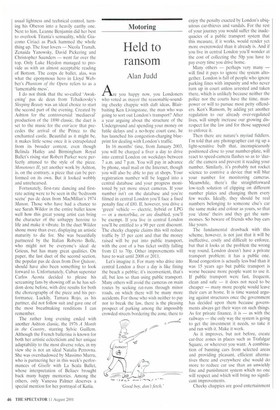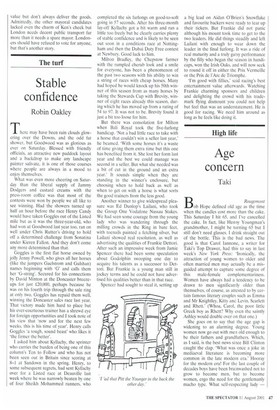Motoring
Held to ransom
Alan Judd
Are you happy now, you Londoners who voted as mayor the reasonable-sounding cheeky chappie with daft ideas, Blairbaiting Ken Livingstone, the man who was going to sort out London's transport? After a year arguing about the structure of the Underground and spending your money on futile delays and a no-hope court case, he has launched his congestion-charging blueprint for dealing with London's traffic.
In 16 months' time, from January 2003, you will be charged a fiver a day to drive into central London on weekdays between 7 a.m. and 7 p.m. You will pay in advance by phone, snail mail or the Internet, though you will also be able to pay at shops. Your registration number will be logged into a central database and your progress monitored by yet more street cameras. If your number isn't on the database and you're filmed in central London you'll face a fixed penalty fine of £80. If, however, you drive a 'green' vehicle — electric, hybrid or LPG — or a motorbike, or are disabled, you'll be exempt. If you live in central London you'll be entitled to a 90 per cent discount. The cheeky chappie claims this will reduce traffic by 15 per cent and that the money raised will be put into public transport, with the cost of a bus ticket swiftly falling from £1 to 70p. Other improvements will have to wait until 2008 or 2011.
Let's imagine it. For many who drive into central London a fiver a day is like fining the beach a pebble: it's inconvenient, that's all, but less so than using public transport. Many others will avoid the cameras on main routes by seeking rat-runs through minor roads, on which there will be many more accidents. For those who wish neither to pay nor to break the law, there is the pleasing prospect of parking among the impossibly crowded streets bordering the zone, there to enjoy the penalty exacted by London's ubiquitous car-thieves and vandals. For the rest of your journey you would suffer the inadequacies of a public transport system that this measure, if it works, would render yet more overcrowded than it already is. And if you live in central London you'll wonder at the cost of collecting the 50p you have to pay every time you drive home.
Many others — perhaps very many — will find it pays to ignore the system altogether. London is full of people who ignore parking fines with impunity and who never turn up in court unless arrested and taken there, which is unlikely because neither the police nor the courts have the time, manpower or will to pursue most petty offenders. Ken's Ransom, by adding yet another regulation to our already over-regulated lives, will simply increase our growing disrespect for the law and for those supposed to enforce it.
Then there are nature's myriad fiddlers. I'm told that any photographer can rig up a light-sensitive bulb that, inconspicuously positioned close to your number-plate, will react to speed-camera flashes so as to 'dazzle' the camera and prevent it reading your number. Similarly, it's probably not rocket science to contrive a device that will blur your number for monitoring cameras. Meanwhile, there's the straightforward low-tech solution of clipping on different number plates and changing them every few weeks. Ideally, they should be real numbers belonging to someone else's car the same make and colour as yours, so that you 'clone' theirs and they get the summonses. So beware of friends who buy cars like yours.
The fundamental drawback with this scheme, however, is not just that it will be ineffective, costly and difficult to enforce, but that it looks at the problem the wrong way round. London doesn't have a private transport problem: it has a public one. Road congestion is actually less bad than it was 15 years ago but public transport is worse because more people want to use it. If public transport were fast, frequent, clean and safe — it does not need to be cheaper — many more people would leave their cars at home. It is time wasted arguing against structures once the government has decided upon them because governments always get their ways on such things. As for private finance, it is — as with the railways — the only way the system is going to get the investment it needs, so take it and run with it. Make it work.
As it improves, but not before, create car-free zones in places such as Trafalgar Square, or wherever you want. A combination of banning cars from selected areas and providing pleasant, efficient alternatives there and everywhere else would do more to reduce car use than an unwieldy fine and punishment system which no one will respect and which will bring no significant improvements.
Cheeky chappies are good entertainment value but don't always deliver the goods. Admittedly, the other mayoral candidates lacked even the charm of Ken's cheek but London needs decent public transport far more than it needs a spare mayor. Londoners should have refused to vote for anyone, but that's another story.



























































 Previous page
Previous page